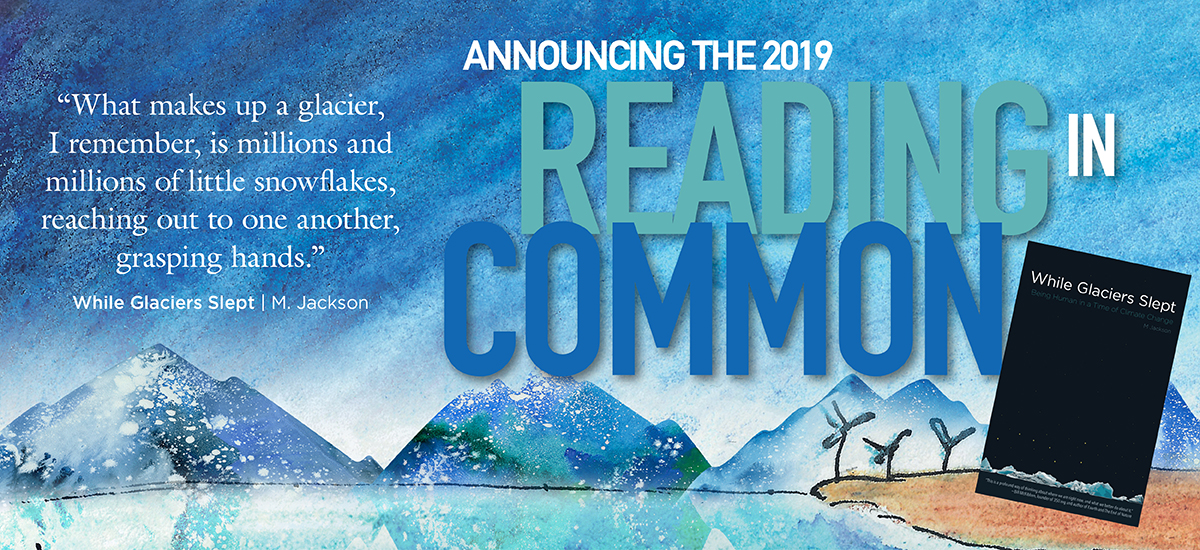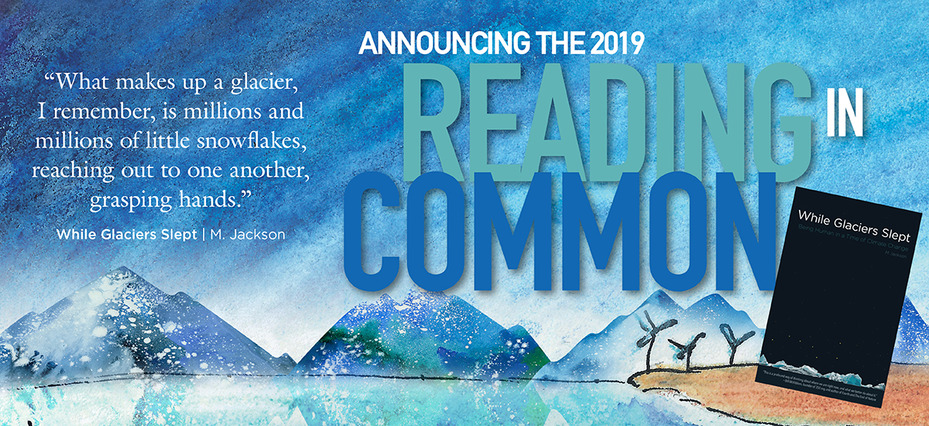Reading In Common Program2019: While Glaciers Slept: Being Human in a Time of Climate Change
About the Book
While Glaciers Slept weaves together the parallel stories of what happens when the climates of family and planet change. Jackson, a National Geographic Expert, reveals how these events are deeply similar and intertwined. She tells the story of her parents’ struggles with cancer while describing in detail the planetary changes she’s witnessed. Above all else, Jackson shows that even in the darkest of times there is clear reason for hope and light. (Source: Green Writers Press)
This book by glaciologist and geographer Dr. M Jackson sets the stage for the 2019 Nobel Conference, Climate Changed: Facing Our Future, which asks "...what kind of people do we need to be to conceptualize and address global climate challenges?" As Jackson conveys, hope and resiliency can and should be embraced as we face a "Climate Changed”. By bringing humanity, as evidenced in one family, to glaciers and climate change, M Jackson portrays in herself and engenders in readers a positive approach to facing any challenge or change, such as entering a college and its community.
About the Author: M Jackson
M Jackson is a two-time U.S. Fulbright Fellow, a National Geographic Arctic Expert, and an adventurer and environmental educator pursuing a doctorate in geography and Earth science at the University of Oregon, where she is researching glaciers and climate change in the Arctic. Jackson is the author of While Glaciers Slept, a book about understanding climatic changes through humanistic lenses. Jackson is currently living in Hofn, Iceland, where she’s researching glaciers and society through a U.S. Fulbright-National Science Foundation Arctic Research Grant. (Source: Green Writers Press)
Learn more about Dr. M Jackson
Visualizing Climate Change
Visualizing Climate Change is a collaboration between the incoming students, the Reading in Common Program, the First-Term Seminar Program, and the Nobel Conference Committee. Incoming students, Gustie Greeters, FTS Peer MALTs, FTS Faculty, and Three Crowns Faculty will identify a photograph, image, or picture of other visual art that either illustrates climate change around them or represents how they feel about climate change.
Participants will submit their visual representation online (see details below), and these digital submissions will be displayed in a slideshow in Lund Forum during the Nobel Conference, Climate Changed: Facing Our Future.
Instructions for Submitting Your Entry:
- Take or find a visual representation that illustrates climate change around you (e.g., environmental changes taking place in your hometown or a favorite location), or that portrays how you feel when thinking about, witnessing, or discussing climate change.
- Submit your visual representation entry using this Google Form.
- Please be aware that you must login with your Gustavus Google account in order to submit your entry.
- Upload the file containing your visual representation (<100 MB) or submit the URL where the visual representation can be found.
- When submitting, you will also be asked to provide a brief description of your entry, along with a written explanation of why you chose it.
- Submit your entry by 12:00pm on Monday, September 2, 2019.
- Please have your visual representation entry, written description, and explanation available at the Book & Visualizing Climate Change Discussion on Monday, September 2, during orientation.
The digital submissions will also be used for a slideshow at the Nobel Conference, Climate Changed: Facing Our Future, in September.
Reading in Common Events:
Book & Visualizing Climate Change Discussion
Monday, September 2, 2019
Location to be announced
Reading In Common Speaker
Tuesday, September 10, 2019 (CANCELED; attempting to reschedule)
Alumni Hall
Nobel Conference 55
Climate Changed: Facing Our Future
September 24 & 25, 2019
Gustavus Adolphus College
Visualizing Climate Change Slideshow
September 24 & 25, 2019
Lund Forum
What do first-year students need to do?
- Actively read this book before arriving on campus.
- Take notes.
- Highlight passages you think are important.
- Consider the following questions for discussion:
- Jackson declares “[Climate change] is here, and we have the capacity to respond to, and grow from, it.” (p. 182) To what extent do you share Jackson’s hope that we can collectively and positively address climate change? Why? What gives you hope, and what gives you doubt?
- Jackson invites us into her life as a woman scientist who is coming of age while coping with the devastating loss of her parents. Why do you think she combined these two narratives? How and why are science and personal narrative related and relevant to climate change?
- Jackson wonders if “it is possible that human society’s existence on this planet is at the cusp of a paradigm shift where our greatest disability— the damage we have done to this planet— could be the catalyst for developing our greatest ability—the human capacity to imagine, learn, and solve problems.” (p.84) Do you agree? And more generally, can (or should) damage be a catalyst for better things?
- Jackson recognizes that “... [she is] part of something larger, a collective fabric that ties us together. We all are.” (p. 92) What was your “collective fabric” before coming to Gustavus? How would you like your “collective fabric” to grow and change during your years at Gustavus?
- Be prepared to discuss the book with your Gustie Greeter and group facilitator during orientation.
- Submit your Visualizing Climate Change entry before coming to discuss the book (see instructions above).
Obtaining Your Copy
While Glaciers Slept: Being Human in a Time of Climate Change is available for purchase at The Book Mark or from online retailers. The Book Mark is located on the lower level of the Jackson Campus Center and will have copies of the book available for purchase during Gustie Gear-Up!
Goals and Aims of the Program
- Encourage intellectual interaction among students in conjunction with faculty
- Welcome students to the academic life of Gustavus
- Facilitate a shared academic experience for all students
- Emphasize reading as a significant component of the college experience
- Tie together transition and integration experiences of first-year students
- Provide opportunities for first-year students to explore issues and ideas relevant to our community and our world
- Connect to the Nobel Conference theme
How is the Reading In Common Program used?
All first-year students, Gustie Greeters, First-Term Seminar Faculty, and Three Crowns faculty teaching first-year courses (Historical Perspectives and Biblical Traditions) read the book over the summer. These students and faculty meet during orientation to discuss the book. The book is often used as a reference or resource in students' First-Term Seminar (FTS).
History of the Program
The Reading In Common Program began in the 2000–2001 Academic Year. Books in the Reading In Common Program have included:
- 2018: The Good Food Revolution: Growing Healthy Food, People, and Communities by Will Allen and Charles Wilson
- 2017: Frankenstein by Mary Shelley
- 2016: Between the World and Me by Ta-Nehisi Coates
- 2015: The Immortal Life of Henrietta Lacks by Rebecca Skloot
- 2014: Where Am I Wearing?, Where Am I Eating? by Kelsey Timmerman
- 2013: A Pearl in the Storm by Tori Murden McClure
- 2012: The Other Wes Moore by Wes Moore
- 2011: The Wolf at Twilight by Kent Nerburn
- 2010: Hotel on the Corner of Bitter and Sweet by Jamie Ford
- 2009: Enrique's Journey by Sonia Nazario
- 2008: Chinese Lessons: Five Classmates and the Story of the New China by John Pomfret
- 2007: Mountains Beyond Mountains by Tracy Kidder
- 2006: Honky by Dalton Conley
- 2005: The Kite Runner by Khaled Hosseini
- 2004: When the Emperor Was Divine by Julie Otsuka
- 2003: The Things They Carried by Tim O'Brien
- 2002: The Legacy of Luna by Julia Butterfly Hill
- 2001: The Chosen by Chaim Potok
- 2000: The Samurai's Garden by Gail Tsukiyama
Books are chosen based on their literary quality, reading manageability (college level reading but not too long), interdisciplinary nature, and connection to the Nobel Conference theme.

